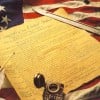Should the Federal Reserve be Abolished - Can it be Reformed?
Here is what the Federal Reserve describes as its charter:
" The Federal Reserve System, often referred to as the Federal Reserve or simply "the Fed," is the central bank of the United States. It was created by the Congress to provide the nation with a safer, more flexible, and more stable monetary and financial system. The Federal Reserve was created on December 23, 1913, when President Woodrow Wilson signed the Federal Reserve Act into law. Today, the Federal Reserve's responsibilities fall into four general areas.
1) Conducting the nation's monetary policy by influencing money and credit conditions in the economy in pursuit of full employment and stable prices.
2) Supervising and regulating banks and other important financial institutions to ensure the safety and soundness of the nation's banking and financial system and to protect the credit rights of consumers.
3) Maintaining the stability of the financial system and containing systemic risk that may arise in financial markets.
4) Providing certain financial services to the U.S. government, U.S. financial institutions, and foreign official institutions, and playing a major role in operating and overseeing the nation's payments systems."
source; http://www.federalreserve.gov/faqs/about_12594.htm
Critics say it has become too powerful and too non-transparent in its actions. I agree. Its actions have affected or created so many economic beasts, like Fractional Lending, that I think it has become more of a facilitator than a monitor.
Although in our modern and globalized monetary systems and economies some mechanism is needed, I believe it should stick to charter point #1 and leave the rest to the Treasury Dept.
What say you?
GAIt is funny you should bring up this topic as I am currently reading a book by Eustice Mullins: Secrets of the Federal Reserve whereby she attacks these principles directly.
http://www.radicalpress.com/?p=442
The Federal Reserve in its efforts to control the economy has crashed it on several occasions. In the twenties they were pissed that the mid west and western banks in charge of the agricultural loans would not agree to national and international banks governing their business and refused to join the Federal Reserve system. In the 1920's the Fed caused the money market to dry up for them and bankrupted many of them in retaliation.
In efforts to keep Europe from crashing in 1929 and put them back on the gold standard the Federal Reserve sold enough gold to make the dollar insolvent and the run on the banks was a confluent result with the paper currency glut that was proven to be valueless in an inflationary crisis..
Recent efforts by some bi-partisan congress members have pushed for an audit of the Fed to delve into the dark secrets they refuse to expose.
http://www.youtube.com/watch?v=zpbW64vR … Nsgw3D6k6w
The big question should be is how to find an impartial and powerful way to guide the economy that is accountable and non threatening to our financial security. Bottom line is who would we trust in their absence?Your points are similar to some of my readings, (in particular the Fed's culpability in The Great Depression) - the ones that caused me to pose the original question.
At this point, I think legitimate public auditing and the sunshine of enforced transparency might be the best first steps in determining if the Fed can be reformed to better suit our national interests, or if it should be abolished.
GAI don't know how we could let it go as money is what runs this country. Without culpability from the mismanagement of the countries money supply we open ourselves to a massive meltdown where everyone loses, even the rich. Apathy will only breed failure.
The Federal Reserve acts as a national bank, which in the eyes of James Madison and Thomas Jefferson is not advisable.
Jefferson:
" I consider the foundation of the Constitution as laid on this ground: That " all powers not delegated to the United States, by the Constitution, nor prohibited by it to the States, are reserved to the States or to the people." [XIIth amendment.] To take a single step beyond the boundaries thus specially drawn around the powers of Congress, is to take possession of a boundless field of power, no longer susceptible of any definition."
http://avalon.law.yale.edu/18th_century/bank-tj.aspThe National Bank which James Madison eventually proposed, despite his opposition to it (!) during his presidency, looked like this:
"There were... nonnegotiable conditions for the establishment of the Bank of the United States.
Among these were:
That the Bank was to be a private company.
That the Bank would have a twenty-year charter running from 1791 to 1811, after which time it would be up to the Congress to approve or deny renewal of the bank and its charter; however, during that time no other federal bank would be authorized; states, for their part, would be free to charter however many intrastate banks they wished.
That the Bank, to avoid any appearance of impropriety, would:
* Be forbidden to buy government bonds.
* Have a mandatory rotation of directors.
* Neither *issue notes nor incur debts beyond its actual capitalization,*
* That foreigners, whether overseas or residing in the United States, would be allowed to be Bank of the United States stockholders, but would not be allowed to vote.
* That the Secretary of the Treasury would be free to remove government deposits, inspect the books, and require statements regarding the bank's condition as frequently as once a week."
http://en.wikipedia.org/wiki/First_Bank … ted_States"Furthermore, they contended that the creation of such a bank violated the Constitution, which specifically stated that congress was to regulate weights and measures and issue coined money (rather than mint and bills of credit)."
Interesting excerpt form a letter from Madison to Jefferson:
"...That these must fail is morally certain; for besides the proofs of it already visible in some States, and the intrinsic defect of the paper in all, this fictitious money will rather feed than cure the spirit of extravagance which sends away the coin to pay the unfavorable balance, and will therefore soon be carried to market to buy up coin for that purpose. From that moment depreciation is inevitable. The value of money consists in the uses it will serve. Specie will serve all the uses of paper. Paper will not serve one of the essential uses of specie. The paper therefore will be less valuable than specie."
http://www.constitution.org/jm/17860812_tj.htm
More good info:
http://en.wikipedia.org/wiki/Federal_Reserve_ActGreat collection of quotes and information. The founding fathers were much less in favor of a strong federal entity save a few such as Hamilton. They did not even favor democracy with Jefferson's quote of mob rule. The real crux of the matter took place with Wilson and Warburg who changed the whole process over to one where the privately held banks got to share in the wealth through the countries debt in the process. The rich elite have been running it since with fleecing the treasury and loading it up with debt from its inception. Recent chairmen of the Fed have refused audits or accountability with their dealings and will continue to do so until required. They rely on our stupidity to change anything.
I was reading in Eustace Mullins book "Secrets of the Federal Reserve" where through essentially writing themselves checks on Government Securities they were able to increase their net worth from 46 Million dollars to 136 billion dollars in a little over 35 years. Who else knows about this or even cares?
We would care if the info was known.
We should all be reading that book.
...are there other true and informative books about the Federal Reserve??I have read numerous reports and historical references about this but this book is very informative by going through the senate hearings questioning the act and goings on of the Fed. I have not read this one but I have heard from friends that this one is a good book on the subject as well.
The Creature from Jekyll Island : A Second Look at the Federal Reserve - G. Edward Griffin.
I am waiting for it to come out on Kindle.
I don't know as much as I wish I did about the Fed, and I don't know what the wide ranging effects of it being abolished might be good or bad. But I do agree with Rand Paul in that, at minimum, it should be subjected to an independent (truly independent mind) audit.
Beyond that I am not well versed enough in the subject to comment on it.Even though I started the thread, I am almost in the same boat as you, ie. not that well-informed about the Fed - yet.
I too agree with Rand Paul's non-transparency complaint. Rumors of non-public, (as in secret), Fed loans and private bailout deals leave me with suspicious doubts.
I can see a need and a primary function for the Federal Reserve, but I don't think what we have now is in our best interests.
GA
Yes, the federal reserve should be abolished. It's insane to think that an institute like this has so much power over the American people. How is printing money without any backing a good idea? Just like many of the the things the federal reserve does, it's not a good idea.
But it does have backing, the USG.
But the reasons and justification for the printing are, as you suggest, a problem.
GAThe USG isn't tangible nor does it have any inherent value.
"The Federal Reserve Act (ch. 6, 38 Stat. 251, enacted December 23, 1913, 12 U.S.C. ch. 3) is an Act of Congress that created and set up the Federal Reserve System, the central banking system of the United States of America, and granted it the legal authority to issue Federal Reserve Notes (now commonly known as the U.S. Dollar) and Federal Reserve Bank Notes as legal tender. The Act was signed into law by President Woodrow Wilson." W
Jefferson:
"To give them the sole and exclusive right of banking under the national authority; and so far is against the laws of Monopoly."
"It would reduce the whole instrument to a single phrase, that of instituting a Congress with power to do whatever would be for the good of the United States; and, as they would be the sole judges of the good or evil, it would be also a power to do whatever evil they please."
http://avalon.law.yale.edu/18th_century/bank-tj.asp
Related Discussions
- 35
5 most important issues
by johnnyco12 15 years ago
Name the five most important issues at stake in the upcoming midterm elections.
- 14
Is the IRS the collection agency for the Federal Reserve?
by qwark 15 years ago
One of the most fraudulent institutions ever perpetrated on the American people and the world, is the Federal Reserve System.Do you agree? Give your opinion as to why or why not.
- 7
What do you think of the federal reserve?
by Marketing Path 12 years ago
What do you think of the federal reserve?Do you think the Federal reserve [a private banking institution] should be able to loan the U.S Government, at interest it's own money? Or should we get rid of the reserve and print our own money without interest.
- 18
End The Federal Reserve - End Of Problem
by Wesman Todd Shaw 14 years ago
It's all so simple, really, and a wicked man stated long, long ago that it never mattered who a king was - so long as he controlled the currency - he was lord and master.http://auditthefedphonebomb.com/bailout … rillion-2/
- 265
The federal reserve wants a North American Union
by Gary Anderson 16 years ago
This guy is or was high up in the Fed. The fed is a PRIVATE bank, despite the lie on their website. The fed is owned by private stock and the US government owns none of that private stock. http://www.frbatlanta.org/publica/eco-r … hriszt.pdf
- 14
The VAT, are we being thrown into it?
by atomswifey 15 years ago
Small Business Encyclopedia:Value-Added TaxA value-added tax (VAT) is a fee that is assessed against businesses by a government at various points in the production of goods or services—usually any time a product is resold or value is added to it. For tax purposes, value is added whenever the value...










